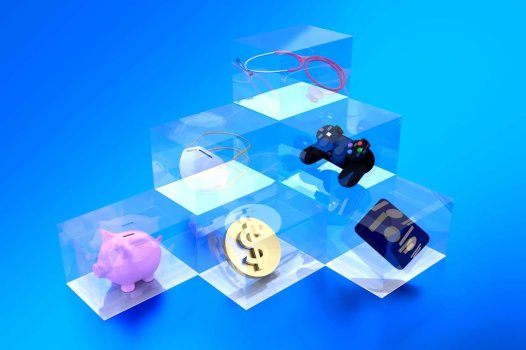When Maria-Eugenia Valle needed to show proof of vaccination to attend a folk-pop concert in Bogotá in September, she pulled out her phone and opened her VitalPass app, which uses blockchain technology to generate a QR code that allows a venue to verify a user’s status. The digital passport is more reliable than a paper vaccination card, which could easily be faked, the 22-year-old says. “You can trust it more, because it’s got a thing with blockchain behind it.”
Blockchain is best known for supporting cryptocurrencies such as Bitcoin, but versions of the technology are fast making their way into many facets of daily life, from vaccine passports to finance, gaming, and cross-border payments. The market for blockchain technology and services is projected to grow to $67.4 billion by 2026, from $4.9 billion this year, according to researcher MarketsandMarkets.
At its simplest, blockchain is a shared database where digital information is recorded and stored in “blocks” that are effectively immutable, making the data on the chain secure and verifiable. Software code called smart contracts allows the blockchain to take on some functionalities of a bank or a game without any human involvement. “The best way to think of blockchain is as a computer, with capabilities we didn’t have before,” says Ali Yahya, a general partner at venture capital firm Andreessen Horowitz. Once a developer writes a program, “the code will continue to operate and run indefinitely.”
Continue reading: https://www.bloomberg.com/news/articles/2021-11-16/what-is-blockchain-how-the-technology-transforms-daily-life
Blockchain is best known for supporting cryptocurrencies such as Bitcoin, but versions of the technology are fast making their way into many facets of daily life, from vaccine passports to finance, gaming, and cross-border payments. The market for blockchain technology and services is projected to grow to $67.4 billion by 2026, from $4.9 billion this year, according to researcher MarketsandMarkets.
At its simplest, blockchain is a shared database where digital information is recorded and stored in “blocks” that are effectively immutable, making the data on the chain secure and verifiable. Software code called smart contracts allows the blockchain to take on some functionalities of a bank or a game without any human involvement. “The best way to think of blockchain is as a computer, with capabilities we didn’t have before,” says Ali Yahya, a general partner at venture capital firm Andreessen Horowitz. Once a developer writes a program, “the code will continue to operate and run indefinitely.”
Continue reading: https://www.bloomberg.com/news/articles/2021-11-16/what-is-blockchain-how-the-technology-transforms-daily-life

